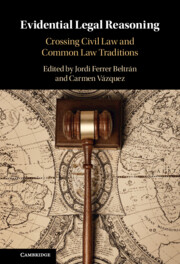Book contents
- Evidential Legal Reasoning
- Evidential Legal Reasoning
- Copyright page
- Contents
- Figures
- Tables
- Contributors
- Introduction
- Part I Evidence As an Area of Knowledge
- Part II Convergences between Systems
- 3 The Transformation of Chinese Evidence Theories and System
- 4 Truth Finding and the Mirage of Inquisitorial Process
- 5 Evidential Remedies for Procedural Rights Violations
- 6 Common Law Evidence and the Common Law of Human Rights
- Part III On Evidential Inferences
- Part IV Expert Evidence
- Part V Standards of Evidence As Decision-Making Rules
- Index
- References
5 - Evidential Remedies for Procedural Rights Violations
Comparative Criminal Evidence Law and Empirical Research
from Part II - Convergences between Systems
Published online by Cambridge University Press: 05 May 2022
- Evidential Legal Reasoning
- Evidential Legal Reasoning
- Copyright page
- Contents
- Figures
- Tables
- Contributors
- Introduction
- Part I Evidence As an Area of Knowledge
- Part II Convergences between Systems
- 3 The Transformation of Chinese Evidence Theories and System
- 4 Truth Finding and the Mirage of Inquisitorial Process
- 5 Evidential Remedies for Procedural Rights Violations
- 6 Common Law Evidence and the Common Law of Human Rights
- Part III On Evidential Inferences
- Part IV Expert Evidence
- Part V Standards of Evidence As Decision-Making Rules
- Index
- References
Summary
The purpose of this paper is not to suggest that there are no differences between the different legal systems, but rather to argue that these differences are not necessarily accurately reflected in the accusatorial - inquisitorial typology. By engaging more with the realities of criminal process, it should be possible to overcome the traditional adherence to the exclusionary rules versus free proof dogma and provide new insights into comparative criminal evidence. These arguments will be illustrated with reference to the evidential consequences of a violation of the right to counsel in Switzerland. This chapter will draw from data collected in the course of a large empirical study of criminal trials, the Trial Observation Project, funded by the Swiss National Science Foundation. The study set out to document the nature of the implementation of trial rights in practice in order to challenge some of the principal assumptions underlying normative theorising on trial rights. The chapter will begin by challenging the assumption that the Swiss criminal procedure system, which clearly falls within the ‘continental European’ tradition, gives the fact-finder total freedom of proof in considering the evidence.
- Type
- Chapter
- Information
- Evidential Legal ReasoningCrossing Civil Law and Common Law Traditions, pp. 84 - 97Publisher: Cambridge University PressPrint publication year: 2022

